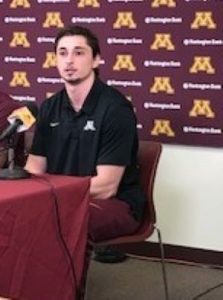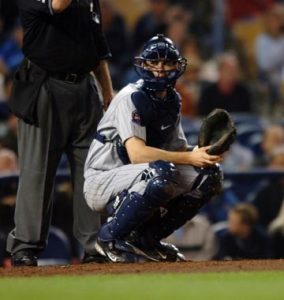In 13 games last season the Golden Gophers football team averaged 20.3 points per game, ranking 12th in the 14-team Big Ten. Minnesota was mediocre running the football and had a dismal passing game, adding up to an offense averaging 300.9 yards per game—again 12th in the league.
“When you have the Big Ten kicker of the Year, you’re probably not very good on offense,” head coach P.J. Fleck said today at Big Ten media days in Indianapolis. Fleck is a big fan of returning kicker Dragan Kesich and his proficiency for kicking field goals but knows his offense must produce in 2024 to improve on last season’s 6-7 record.
Fleck said personnel limitations and injuries dictated what the offense could do last season. “We want that to be better. We want that (offense) to be way more balanced,” Fleck told reporters in Indy at a news conference televised on BTN. “We also have to have the personnel to do that, which I think we have.
“We’re deeper at wideout, we’re deeper at tight end. We’ve basically got our whole line coming back. We’ve got a really good quarterback who is really consistent. …We’ve got a running back room that’s really deep. And if we can stay healthy, we can be balanced and be consistent on a daily basis on the offensive side of the ball.”

At the most important position in football, Minnesota has newcomer Max Brosmer. The transfer from New Hampshire was a second team FCS All-American last season.
Fleck said the Gophers were committed to finding a portal quarterback for 2024 who would be the starter. Someone with talent and a match for the program’s culture that stresses teamwork, academics and citizenship. Fleck tells his players to work at being better people than players, believing if you’re a better person you will become a better player.
Brosmer will have just one season of eligibility with the Gophers, but his leadership has already been so apparent to the coaches and players. “He’s a meticulous ‘why’ seeker and he’s a very, curious, curious individual. And anytime you have a curious leader, you can accomplish a lot.
“The quote that he is a coach on the field gets thrown around a lot, but he truly is. He could be a doctor and a surgeon which he probably will be, but he’ll be a phenomenal coach if he decides (to be) that one day after he’s done playing.”
Adam Weber, the former Gopher quarterback who still holds school records for career passing yards and career touchdown passes, has spent time with Brosmer. “He’s very impressive,” Weber told Sports Headliners Tuesday.
Worth Noting
Fleck, entering his eighth season with the Gophers, said he and athletic director Mark Coyle have worked together longer than any head football coach-athletic director duo in the Big Ten. Fleck emphasizes the importance of sustainability in a program’s culture that comes about when leadership is in place for a long time. Minnesota had four different head coaches between 1997 and 2016.
An example, he said, of how culture translates into sustainability is the Gophers return 16 of 17 eligible starters from last season’s team.
None of those starters has received more preseason hype than offensive tackle Aireontae Ersery. Ersery is a member of the latest EA Sports College Football 25. Not only ranked at No. 24, but he is also the highest rated offensive lineman in the Big Ten.
Fleck reiterated he “loves Minnesota” and said he and wife Heather have been building a new home for more than two years and it will be completed in two weeks.
Thirteen Golden Gophers have been named as candidates to play in the January 30, 2025 East-West Shrine Bowl in Arlington, Texas. That’s more than defending national champion Michigan has with nine on the watch list for the postseason all-star game.
Gophers are: Max Brosmer, Quinn Carroll, Tyler Cooper, Aireontae Ersery, Jack Henderson, Daniel Jackson, Jah Joyner, Dragan Kesich, Cody Lindenberg, Jalen Logan-Redding, Elijah Spencer, Danny Striggow, Justin Walley. https://shrinebowl.com/shrine-bowl-1000/
Former Gophers defensive back Brock Vereen, along with Rick Pizzo, Gerry DiNardo and Howard Griffith, will host a new 30-minute B1G Countdown to Kickoff show on BTN this summer and fall to prepare fans for the Big Ten games of the day.
Condolences to family and friends of Rochester native and Gophers’ swimming great Steve Jackman, 83, who died last month. Once referred to as “the fastest man in the world” after twice winning the NCAA 50-yard free style races, Jackman was an 11-time All-American at Minnesota. Jackman graduated in 1968 from the University of Minnesota Medical school and practiced radiology at the Mayo Clinic and Memorial Medical Center in Springfield, Illinois, according to the Springfield-based State Journal Register website.
Timberwolves superstar Anthony Edwards is the youngest player at age 22 on the men’s Olympic basketball roster. Wolves coach Chris Finch sees another opportunity for Edwards to grow from the opportunity, watching how some of the world’s greatest players prepare and handle themselves as professionals.
Edwards has predicted he can contribute in big moments for the U.S. team. “His confidence is something that fuels him, to be quite honest with you,” Finch told Sports Headliners earlier this month.
The team’s opening game in the Paris Olympics is Sunday against Serbia. Start time is 10:15 a.m. CDT with NBC televising.
The Summer Olympics begin tomorrow and cybersecurity company AVG has a warning: phishing and scam attacks rise during the summer and winter games. Attacks were up 280 percent during the 2021 summer Olympics and 238 percent for the 2022 winter games, per AVG.
Hollis Cavner has been a golf trailblazer here for more than 30 years. His efforts began with the Burnet Senior Classic in 1993, then the Coldwell Banker Burnet Classic and 3M Championship and now the 3M Open, Minnesota’s PGA Tour stop in its sixth year and going on this week at TPC Twin Cities in Blaine.
Cavner, his employees and volunteers have put high quality golf on the map in Minnesota while raising millions of dollars for local charities and boosting the economy. With the objective of growing interest in the game, kids 16 and under are admitted free to the tournament.
Cavner excels in building relationships including with young golfers such as Sahith Theegala who turned pro in 2020 and is now ranked No. 11 in the world. He will be at the 3M Open as will young players granted an exemption to participate including former Gopher Ben Warian.
Comments Welcome






